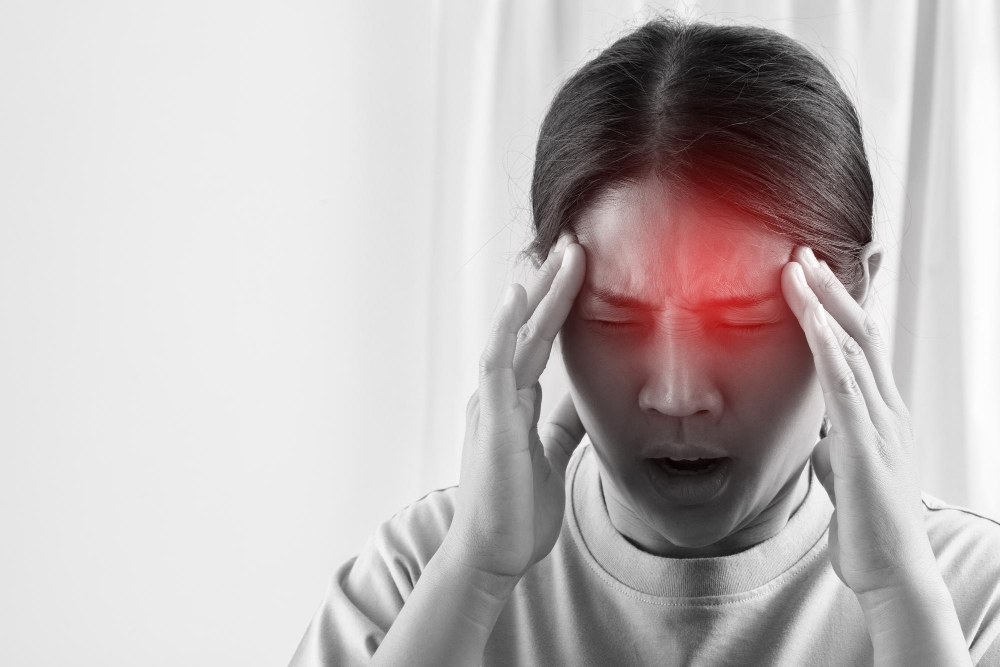1. What is the treatment for tension headaches and stress headaches?
It is mainly carried out with non-steroidal anti-inflammatory drugs , most often combined with muscle relaxants (an example of such a combined preparation is Parafon).
Since the psychogenic stress of the patient plays an important role in this headache, medications from the group of antidepressants are also used with good effect .
2. How to prevent tension headache and stress headache?
Avoid stress if you can! Sufficient sleep , regular nutrition, stop alcohol and smoking.
Use the so-called psychotherapeutic approach, allowing you to understand the symptoms and calm down.
Regarding the hygiene of life:
-
relaxite is – e.g. massage, relaxation methods, etc.
-
regular physical activity
-
plan rest periods
-
in no case do not overdo the use of painkillers
If the above mentioned tips do not lead to the desired success, contact your doctor!
3. What is a tension headache?
80% of people suffer from this type of headache. It occurs equally in children and adults. It is due to muscle contraction and is usually associated with a stressful situation. It occurs with equal frequency in both sexes.
Flow rate:
-
manifests as a moderate, frontal or dark headache
-
daily headache , the pain is bilateral, often covering the neck and back of the head
-
covers periods of months and even years
-
it intensifies during mental stress
-
loses weight during periods of mental rest (holiday or vacation)
-
often patients describe a feeling of emptiness in the head rather than real pain
-
it is not accompanied by nausea, vomiting , does not disturb the patient’s sleep
-
it is often supported by a masked anxiety or depressive state
4. What types of headaches does stress cause?
-
psychogenic headache – almost daily headache, covering periods of months and even years without headache-free periods. Loses weight during mental rest (holiday or vacation). It is provoked by stress and mental tension. Prevention – avoiding stress. Treatment is through psychotherapy, relaxation techniques, less often psychoanalysis.
-
tension-type headache – dull, non-pulsating pain, often bilateral, associated with tightness in the occipital region or neck. The degree of severity leaves constant. It is provoked by emotional stress, larval (hidden) depression. Prevention aims to avoid stress. Treatment – rest, aspirin, acetaminophen, naproxen, combined analgesics with caffeine, ice, mirelaxants psychotherapy, biofitback. If necessary, temporary use of stronger analgesics.
-
chronic daily headache – occurs in 4-5% of the population and is primary – lasts 15 or more days per month; secondary – as a manifestation of other diseases of the brain – vascular, neoplastic, infectious, traumatic. It is often accompanied by depression or anxiety. It is provoked by stress, tension, abuse of certain medications (barbiturates, opioid analgesics). Prevention – avoiding stress, antidepressants. Treatment – antidepressants, anticonvulsants, beta-blockers, calcium antagonists.
-
post-traumatic headache – localized or generalized pain, may resemble symptoms of migraine or tension-type headache. It is blamed daily and often does not respond to treatment. The pain can occur after relatively minor injuries. It is often difficult to diagnose the cause. Treatment – anti-inflammatory drugs, propranolol or biofeedback.
5. What is a headache during physical and mental stress?
-
headache after exertion – generalized pain in the head of short duration (minutes to 1 hour) during or after physical exertion (running, jumping or sexual intercourse or passive exertion – sneezing, coughing and defecation). In 10% the cause is an organic disease (aneurysm – dilation of a blood vessel, tumor or vascular malformations). C 90% is associated with migraine or cluster headache. Alternative forms of loading are recommended – avoid sudden loads. If you need treatment, contact a neurologist specialist. The exact cause must be determined.
-
headache due to eye fatigue – usually the pain is localized frontally (in the forehead area), bilaterally directly related to eye fatigue. A rare cause of headache. It is caused by uncorrected vision, astigmatism. It is recommended to observe “hygienic” rules when reading and working with a computer. Treatment – vision correction.
-
hunger headache – the pain starts immediately before mealtime. It is caused by muscle tension, low blood sugar and rebound dilation of blood vessels, too much sleep or missing a meal. It is provoked by persistent dieting or skipping meals. A regular diet with food containing sufficient protein and complex carbohydrates is recommended.
6. What is stress?
Stress means a state of extremely increased demands on the body of a different nature. Factors causing a state of stress can be:
- disease state
- physical overload
- mental and emotional overload
- extreme conditions on Wednesday
The state of stress is accompanied by changes in the organism aimed at adaptation, adaptation of the organism to extreme conditions and its survival. Changes occur at the hormonal and neuro-regulatory level – cerebral cortex and subcortical structures and endocrine system.
